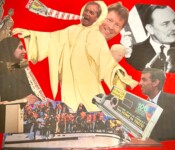Viewpoint – Censorship: When Silence is the Price for Truth…Journalism in DRC
Reporters Without Borders stated that a journalist from Radio Liberté and two journalists from Kisangani News were released from prison in the last few weeks.Their crimes were that they asked too many questions about the government… But at least they are still alive.
According to Committee to Protect Journalists (CPJ) between 1993 to 1998 four journalists were reported killed in Democratic Republic of Congo (DRC). Between 2005 and 2011 that figure was eight. To add to these atrocities, during the 2011 presidential elections a private television station, which favoured the opposition opponent Etienne Tshisekedi, was torched before the voting started.
Synchronicity Magazine spoke to DRC born Nancy Bokanga who works as an employment advisor and who fled to the UK in 1997 as a refugee to create a better life for her self . She feels that it is due to censorship and the repression of journalist’s that makes it difficult for people to understand what is going on in the DRC. She is disappointed by the lack of coverage and awareness outside the country and as facts are censored from news organisations inside the country, the only way to stay informed is through contacts she knows in the media and family that are still there. Nancy said: “To be a journalist [in the DRC] is to be something like a daredevil, you’re playing with fire, write something too critical and you’re finished! When you pick up a newspaper you want to know what’s happening but if people have to hide things and they can’t say what they like what is the point? You’re just wasting your time. Sometimes I feel like the world has given up on the DRC. It’s difficult for me to hear about what’s going on there unless I ask people from back home.”
Africa as a whole continues to face a number of difficulties as it tries to continue as a developing continent. Nancy believes that the problems around censorship are not just confined to her country. She spoke about the fact that those in power could not handle being judged and just like in DRC, “no other corrupt or unstable African government can take criticism.”
Although the 40-year-old had a hard time when she arrived in the UK, finding a job and learning a new language, she still felt that leaving was the best thing she could have done at the time, especially due to the lack of women’s rights in the country. There have been many reports of abuses with both government and rebel troops being accused. Stories of soldiers raping women in front of their fathers and husbands have also emerged. Nancy spoke about feeling selfish because she left so many people behind but that her grandmother, who she lived her whole life with, begged her to leave especially as a woman.
Ten years on it is estimated that five million people have been killed in the DRC. Many are left without food, water and some have had to seek refuge abroad like Nancy did. Many of the numerous atrocities continue to go unreported as journalists and civilians alike are threatened with violence or killed. Nancy said: “I left before 1998, before things got really worse I was lucky enough, but there are many of those who aren’t. At the time [Laurent-Désiré] Kabila was talking about voting on a new constitution, and he promised things would be different. But what happened? Nothing. It was more lies, his people were the ones out there killing [Rwandan] refugees and now we have Joseph Kabila who the UN are working with. I don’t see results from their ‘peacekeeping’ so far and at the time of last year’s elections you’d be very lucky to get a story out as a journalist. It got to the point where whatever you wrote would determine whether you lived or died. Is this life?”


























